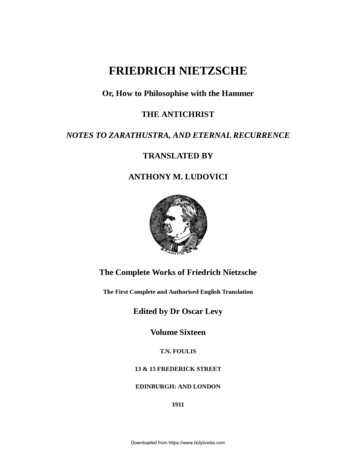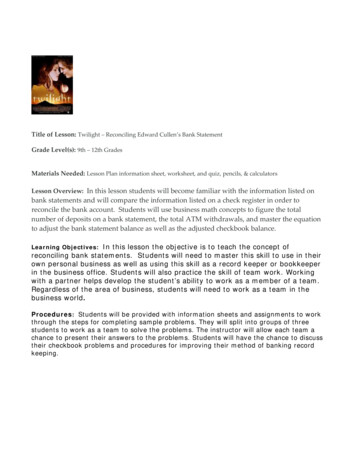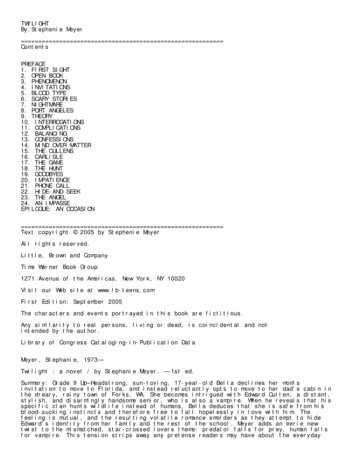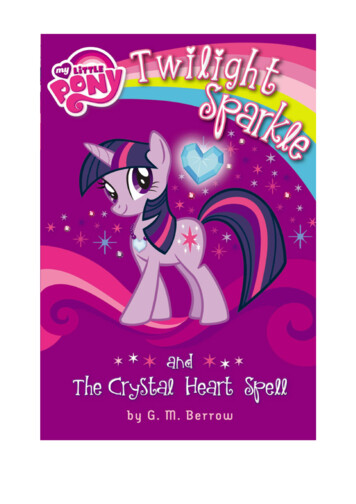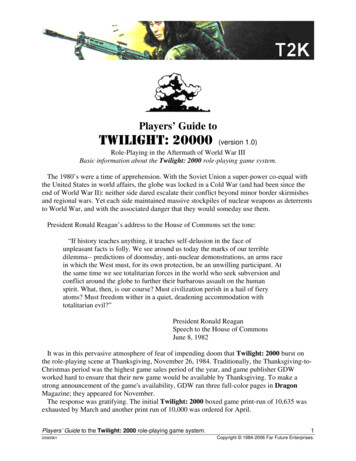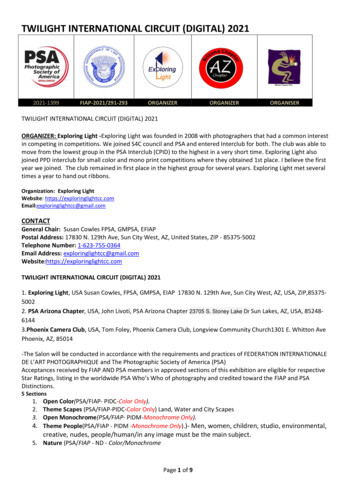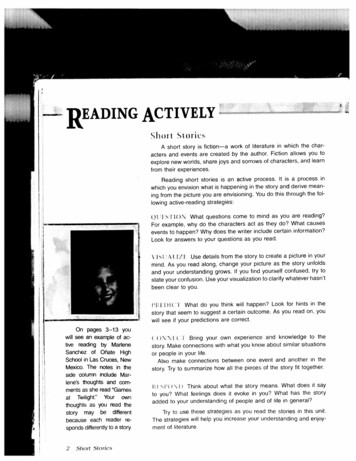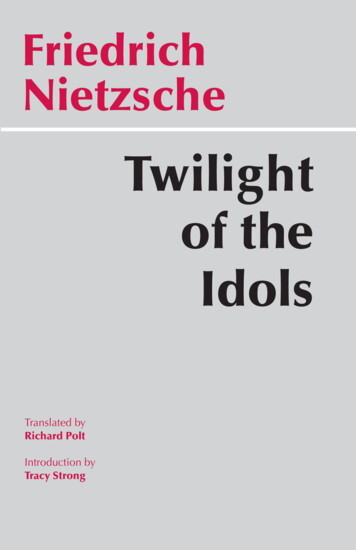
Transcription
FriedrichNietzscheTwilightof theIdolsTranslated byRichard PoltIntroduction byTracy Strong
Twilight-00Book Page i Monday, August 24, 2009 4:52 PMTwilightoftheIdolsBlack process 45.0 133.0 LPI
Twilight-00Book Page iii Monday, August 24, 2009 4:52 PMFRIEDRICHNIETZSCHETwilightoftheIdolsOr,How to Philosophizewith the HammerTranslated byRichard PoltIntroduction byTracy StrongHackett Publishing Company, Inc.Indianapolis/CambridgeBlack process 45.0 133.0 LPI
Friedrich Nietzsche: 1844–1900Twilight of the Idolswas first published in 1889.Copyright 1997 by Hackett Publishing Company, Inc.All Rights ReservedCover Design by Listenberger Design & AssociatesInterior Design by Dan KirklinPrinted in the United States of America4 5 6 710 09For further information, please addressHackett Publishing Company, Inc.P. O. Box 44937Indianapolis, Indiana 46244–0937www.hackettpublishing.comLibrary of Congress Cataloging-in-Publication DataNietzsche, Friedrich Wilhelm, 1844–1900.[Götzendämmerung. English]Twilight of the idols, or, How to philosophize with the hammer/[by Friedrich Nietzsche]; translated by Richard Polt;introduction by Tracy Strong.p.cm.Includes bibliographical references and index.ISBN 0-87220-355-7 ISBN 0-87220-354-9 (pbk.)1. Philosophy. I. Title.B3313.G67131997193—dc21 96-40331CIPISBN-13: 978-0-87220-355-6 (cloth)ISBN-13: 978-0-87220-354-9 (pbk.)Adobe PDF ebook ISBN: 978-1-60384-880-0
Twilight-00Book Page v Monday, August 24, 2009 4:52 PMContentsIntroduction by Tracy Strong. viiBibliography on Nietzsche. xxixTranslator’s Note . xxxiTwilight of the IdolsForeword . 3Epigrams and Arrows . 5The Problem of Socrates . 12“Reason” in Philosophy. 18How the “True World” Finally Became a Fiction . 23Morality as Anti-Nature . 25The Four Great Errors. 30Those Who “Improve” Humanity . 38What the Germans Are Missing. 43Raids of an Untimely Man. 50What I Owe to the Ancients. 86The Hammer Speaks. 92Index . 93vBlack process 45.0 133.0 LPI
Twilight-00Book Page vii Monday, August 24, 2009 4:52 PMIntroductionHammers, Idleness and MusicMusic now brings me sensations such as I have never had before. Ittakes me away from myself, it sobers me up from myself, as if Ioversaw myself from a distance, it gluts my senses (überfühlte) . . .Life without music would be an error, a hardship, an exile.Letter to Köselitz, 1/15/88In the end, what is there for it? There is no other means to bringphilosophy again into honor: one must first hang all moralists.Nachlass, WKG VIII3 p. 4121Friedrich Wilhelm Nietzsche was born on October 15, 1844, in the townof Röcken, near Leipzig. He was the son and grandson of Lutheran ministers. When he was four his father passed away and half a year later ayounger brother suddenly died. He was brought up with his sister by hismother and two aunts. A brilliant and precocious student, he was educated in Schulpforta, one of the top private schools in Germany. He wentfrom there first to Bonn and then to Leipzig to study classical philology.His reputation and recommendations were such that, while still finishinghis studies, he was called to the chair of classical philology at the University of Basel.In 1870, he volunteered as a medical orderly in the Franco-Prussianwar. After his return to the university, he became part of Basel intellectualcircles, in constant contact notably with the historian Jakob Burckhardtand the ethnographer J. J. Bachofen. He became a close, even intimate,friend of Richard and Cosima Wagner, who then were living near Lucernein central Switzerland, and was a frequent visitor at their home.His first work, The Birth of Tragedy from the Spirit of Music, appearedin January of 1872. The book attacked the received wisdom of the time—that the Greeks were people of “sweetness and light,” the “children of therace,” as it were—and it appeared to see in the music drama of RichardWagner the possibility of a rebirth of Greek tragedy in contemporaryGermany. Unsurprisingly, it became the focus of an intense intellectualconflict in German university circles, all the more so for having beenwritten without footnotes and in an occasionally exalted prose style.viiBlack process 45.0 133.0 LPI
Twilight-00Book Page viii Monday, August 24, 2009 4:52 PMviiiTwilight of the IdolsNietzsche was deemed at the time to have lost the intellectual battle.Between 1873 and 1878, he abandoned several works in progress andpublished only the four “Untimely Meditations,” essays on cultural subjects written in the style of Emerson, a writer Nietzsche much admired.In 1878, the first volume of Human-All-Too-Human appeared; the sameyear occasioned his public rupture with Wagner. His health, precarious inthe best of times, was poor enough that he asked to be relieved of histeaching duties at Basel. Granted a small pension, he began a nomadiclife, spending summers in Sils-Maria in southeastern Switzerland and therest of the year in towns in southern France and northern Italy. His writing pace accelerated: he produced Dawn of Day (1881), The Gay Science(1882), Thus Spoke Zarathustra (1883–85), Beyond Good and Evil (1886),On the Genealogy of Morals (1887), and the books of 1888 mentionedbelow. Sales were minimal, as was public recognition until 1887, when theDanish critic Georg Brandes gave a series of public lectures in Copenhagen on Nietzsche’s work.2 On January 4, 1889, Nietzsche collapsed on astreet in Turin. His friend Franz Overbeck brought him back to Germany,where he was hospitalized in an asylum, and then released to the care ofhis mother and sister. His reputation, however, had begun to spreadwidely across Europe and the United States. He died on August 15, 1900,having never recovered his sanity, but already recognized as an importantintellectual figure.The present volume, Twilight of the Idols, was written during the firstweeks of the summer of 1888, the last year of Nietzsche’s life in sanity,the year which saw an intense accelerando in Nietzsche’s already substantial productivity. An enormous, almost compulsive, output of books andletters cascaded from his pen. In the epigraph to Ecce Homo, in life-exultant language reminiscent of the opening paragraph of Emerson’s “Divinity School Address,” he refers to these books as the “gift of the year”3 andcalls particular attention to The Antichrist, the Dionysus-Dithyrambs, andTwilight of the Idols. To those one must add almost three hundred lettersas well as two works on Wagner: The Case of Wagner and a collection ofhis writings on Wagner from throughout his life, Nietzsche Contra Wagner. It was, he wrote to Franz Overbeck, the autumn of his life, his “greatharvest time.”4In this context, Nietzsche’s intention for Twilight is quite clear. In aletter to the composer Heinrich Köselitz (nom de plume: Peter Gast) onSeptember 12, 1888, he writes that he has just sent off to his publisher amanuscript with the title “A Psychologist’s Idleness.”Black process 45.0 133.0 LPI
Twilight-00Book Page ix Monday, August 24, 2009 4:52 PMIntroductionixUnder this harmless title there is hidden a very sharp, precise, andquick digest (hingeworfene Zusammenfassung) of my essential philosophical heterodoxies: this is so that the book can serve to introduceand whet the appetite for my Revaluation of All Values (the firstbook is practically completely worked out). There is a lot in it ofjudgments on the present, on thinkers, writers and such.5In a letter of September 14 to Paul Deussen, he speaks of this book andits immediate predecessor, The Case of Wagner, as “just recuperations(wirkliche Erholungen)” in the course of his greater task, which, whenaccomplished, “will split humanity in halves.” Twilight is a book thatlooks in two directions.6 It summarizes what Nietzsche thought he hadachieved before 1888: a harvest of what he had done during the precedingtwo decades. Furthermore, he thinks of this work—that which he hasaccomplished since the Birth of Tragedy—as preparatory to his life’s creative work, the projected Revaluation of All Values. Nietzsche had difficulty, however, in accepting any of his work as the actual first step of thisnew project. At one point, he seems to have thought of The Antichrist (thevolume referred to in the paragraph above) as the first volume of the newwork. However, he crossed this subtitle out in manuscript and substitutedthe one that it presently bears, “Curse upon Christianity.” It is not therefore apparent that Nietzsche understood anything that he wrote to beother than preparatory for his major philosophy. In any case, it is clearthat Nietzsche intended Twilight to be both an introduction to work thatwas to come and a summary of the critical work that he had engaged inover the preceding eight years. Twilight, as Nietzsche says in his autobiography, is the work of a nunciatory angel.7As he had written to Köselitz, the title of the present book was originally to be “A Psychologist’s Idleness.” An earlier version of the first aphorism: “Idleness is the start of all philosophy. Is philosophy then a sin?”8explains some of what he had in mind. It also recalls Aristotle’s understanding that the beginnings of philosophy were in wonder and raises theissue of the status of philosophy. Upon prompting from Köselitz—whofound it inadequately thunderous—Nietzsche tried out a number of variations and came up with “Twilight of the Idols.” A few things should benoted about the new title. First, in the course of finalizing the new title,Nietzsche twice tried out as a subtitle “How a Psychologist Asks Questions.” In all but the final version, the book is to be called Götzen-Hammer, the Hammer of the Idols.9 The hammer functions, Nietzsche says inthe preface, as a “tuning fork” to the idols, that is, as a way both of ques-Black process 45.0 133.0 LPI
Twilight-00Book Page x Monday, August 24, 2009 4:52 PMxTwilight of the Idolstioning whether or not they sound true when struck while at the sametime sounding a true note. Note that when a tuning fork is used to strike ahollow object there is a resonance from both the object and the fork. Thetwo notes are necessary to the operation.The title resonates in several ways. One is to Francis Bacon and hisattack on “idols of the mind.”10 Nietzsche speaks favorably of Bacon’s“realism,” the trait he draws special attention to as admirable in Thucydides at the end of Twilight. Whatever realism actually is, it is at least notmistaking the world for that which one wants it to be—as he accusesalmost all of Western philosophy in one way or another of doing. Twilightis thus about the accounts of the world that humans want to give to themselves in order to keep themselves from seeing the world (and themselves) as it is. It is thus necessarily also about the reasons that they givethemselves such accounts.Additionally, even more closely in German than in English,Götzendämmerung calls to mind Götterdämmerung, the title of the lastopera in Wagner’s Ring des Nibelungen. Götterdämmerung is an operaabout the end of the reign of the gods. In Götterdämmerung, the reign ofthe gods comes to an end because the gods are unable to live both withintheir own law and justly. The German Dämmerung, like its English translation “twilight,” refers to that time between the dark and the light of day,with no immediate indication of which comes after which. Therefore,“Twilight of the Idols” does not indicate whether it marks a transitionfrom day to night or the other way around. All it claims to do is to soundthe clear note that comes between being out of tune and being in tune:like twilight, it marks the time between what came before and the beginning of that which comes after. It is intended to make it impossible to livewith idols.If we may therefore find in Twilight what will become Nietzsche’s revaluation of values, we cannot look there for the actual revaluation. The finaldateline to the revised preface—“September 30, 1888, on the day whenthe first book of the Revaluation of All Values was finished”—indicatesonly that Nietzsche thought that what he had accomplished in this bookmade possible such a revaluation. It does mark, however, the end of thecourse on which Nietzsche’s life had been set as he came to deal with thelack of understanding with which his first book, The Birth of Tragedy, hadbeen greeted. His hope in the early 1870s for a two-pronged culturalrebirth, led by Wagner’s music and his own sense of the possibilities forpedagogy, had been dashed by the reception afforded his first work.11 Hehad embarked instead on a long critical journey through the social andBlack process 45.0 133.0 LPI
Twilight-00Book Page xi Monday, August 24, 2009 4:52 PMIntroductionxiepistemological structures of the Western world, and by 1888 he finallyfelt that he was at the end of that traverse.With this in mind, how should one read Twilight of the Idols? MichaelGillespie has argued that the organization of the book takes its cue fromthe reference to music.12 He finds the book as a whole to be composed inclassical sonata A–B–A style, in which a theme is initially sounded in atonic key, is developed through a series of modulations and variations inother keys, and finally returns to the original tonic. The initial analysis ofthe Greeks forms the tonic key to which Nietzsche eventually, after necessary developmental modulations, can finally return. The Germans and,in a modulated way, other idols, form the dominant chord, which, afterdevelopment and a set of variations (“Raids of an Untimely Man”), callsfor a return to the tonic, in this case the Romans and Greeks (“What IOwe to the Ancients”). In this way, Twilight becomes for GillespieNietzsche’s attempt at a resolution of the age-old conflict of philosophyand poetry. For Gillespie, the solution is prefigured in the materials ofthe introduction and in Nietzsche’s presentation of himself in “Epigramsand Arrows.”13Gillespie’s analysis is detailed and often revelatory, and its major conclusion—that Nietzsche places himself in opposition to Socrates—clearlyhas important truth in it. But his essay is written from, one might say, thecomposer’s point of view. To continue the analogy with music, Gillespie isconcerned with how the book is composed and not so much with how it isheard. He does not deal with the experience of reading, or hearing, thebook. My approach thus complements rather than supplants Gillespie’s: Ipropose to write about Twilight from the point of view of the listener.What does it mean to read with one’s ear, musically? My questionbecomes, “What happens to one when one reads Twilight of the Idols?”If Twilight is intended to be Nietzsche’s thought “in nuce,” as he wroteto Brandes,14 what is that nutshell? As is always the case with Nietzsche,there are a number of ways to provide what looks like an answer. ReadingNietzsche is (meant to be) an education in itself.On one level there is, I might say, the Cook’s tour. It might go asfollows: In the first section, “Epigrams and Arrows,” Nietzsche expresses ahostility toward and distrust of all systematization: the desire thateverything should fit together and make sense is in the end a desire fordeath. In the next section, he explores that desire in its paradigmaticembodiment, in Socrates. Nietzsche considers any moral judgmentBlack process 45.0 133.0 LPI
Twilight-00Book Page xii Monday, August 24, 2009 4:52 PMxiiTwilight of the Idolsabout the value of life to be a life-endangering category mistake. In thethird section, on “‘reason’ in philosophy,” he analyzes the philosophical errors that have led to the prejudice that morality has a groundingindependent of human life—that is, to the moralization of morality (aswith Socrates in the previous section). The fourth section proposes aphilosophical fable on “how the true world became a fable” and mightdescribe the recovery of the possibility of beginning to do philosophy. Accordingly, in the following section (“Morality as Anti-Nature”),Nietzsche revisits the topic of morality in order to establish whatbeginning to think (to do philosophy) would mean in the present age.The “Four Great Errors” section shows the epistemological errors atthe root of the moralizing of the world and then moves to a condemnation of those who claim to act on moral principle in order to makehumanity better. Nietzsche now turns to the world around him, to how these errorshave become flesh in the modern world.15 The section on the Germansattributes the decline of what is called German “culture” to the lack ofa system of true higher education, a theme already present inNietzsche’s earliest work at Basel. Then, in the longest section of thebook, he engages in a dialogue with a set of more or less contemporaryauthors who evince some of the qualities he has just condemned. Fiveentries on French thinkers are followed by five on psychology, art, andartists, opposing reality to the idealization of these French thinkers.The same themes are replayed in an examination of Anglo-Americanthinkers; this is followed by an exploration of the direction in whichthey send us—toward the aesthetic valuation of the human being.Lastly, Greece and Germany are brought back into contact with eachother in order to explore the importance of sexuality to both art andphilosophy. The rest of “Raids” moves back to themes in the culture—morality,freedom, and genius—and from there to political and social questions.It closes by returning to Rousseau, whose “return to nature” Nietzschecontrasts with his own. Nietzsche then raises the question of Goethe,who, he intimates, called for a course of European events differentfrom that which has been taken. The penultimate section—“What IOwe to the Ancients”—indicates that paths which might have existed(e.g., Goethe’s) are no longer viable. This absence requires an encounter with the Roman and Greek openness to the real—not the Greeks ofsweetness and light (as even Goethe would have had it), but the GreeksBlack process 45.0 133.0 LPI
Twilight-00Book Page xiii Monday, August 24, 2009 4:52 PMIntroductionxiiiof the Dionysian orgy, of the sexual excess which obliterates receivedboundaries. Nietzsche notes that he has returned to the ground fromwhich his first book, The Birth of Tragedy, grew.The preceding four paragraphs provide a quick tour of the territorythat Nietzsche covers in Twilight. They are, however, experientially thinparagraphs, even if they do point us in the direction of Nietzsche’s concern with starting to think again, a quality he finds lacking in his world.16One may well complain: “But this is not Nietzsche! You are turning himinto a dry analytic philosopher! Soon you will be telling me whether ornot his arguments are correct, asking how we know what he tells us to betrue!” 17 There is something important in this response. ReadingNietzsche is not like reading academic philosophy. This does not meanthat it is not philosophy (or that it is bad philosophy, although many willargue that it is), but that one needs to take into account the fact that something is missing in what he says (more accurately, in one’s experience ofwhat he says) if one approaches it as I did above. Here a door is opened toa second kind of reading; it most often comes as a rehearsal of memorablesentences, of maxims. Here are a few from throughout the book. I extractthese citations from longer entries, avoiding those that exist only as numbered aphorisms. The value of life cannot be assessed. [The Greeks] were in danger, they had to make this choice: either to bedestroyed or to be absurdly rational. Whatever is, does not become; whatever becomes, is not . . . Along with the true world, we have also done away with the apparent! All healthy morality is ruled by an instinct of life. The concept “God” was up to now the greatest objection againstexistence. There are no moral facts at all. How much beer there is in the German intellect! This new law table, O my brothers, I set over you: Become hard!Note first that these sentences say roughly what I said in the summaryparagraphs above, but their effect is different. They are like fortuneBlack process 45.0 133.0 LPI
Twilight-00Book Page xiv Monday, August 24, 2009 4:52 PMxivTwilight of the Idolscookie notes which are sufficiently gnomic to be taken seriously. These areNietzsche’s words: these passages are from his text. What is the status ofsentences such as these, which occur not only here, but also throughoutNietzsche’s work? How is the reader to respond to them?First, there is a great temptation to succumb to Nietzsche’s quotability. Indeed, in Zarathustra, Nietzsche notes, partially as a warning, that“Whoever writes in blood and aphorisms wants not to be read but to belearned by heart.”18 To understand an aphorism one must take it insideoneself so that it becomes oneself (think of this as incarnation) and ruminate on it, something for which, Nietzsche says, “one has almost to be acow, and certainly not a modern man.”19 Aphorisms do not dominate orcontrol their readers. One reads an aphorism: if it seems to be a truism, orpatently false, or nonsensical, it is abandoned and forgotten, jogging perhaps only thoughts about the foolishness of those who would considersuch a claim meaningful. If one is touched by it and responds, however,something is stirred. It is only at this point that exegesis begins, not as anattempt to determine what the aphorism means, but to describe the worldto which one has responded through the aphorism. The aphorism presents itself as an answer to which we do not know the question—it is theParsifal of discourse.20 Writing in aphorisms is thus an attempt to recoverquestions—to recover philosophy—and thus Twilight is a book about howto ask questions.Here one must proceed very carefully, for such writing is also a temptation. As such, it is meant to be a temptation and to be experienced assuch. Nothing in Nietzsche can be read properly without hearing the resonance that any section of a sentence sets up, both with the rest of the sentence and with the rest of the entry of which it is a part, as well as withthose entries that are around it. Werner Dannhauser properly points tothe importance of the aphorism in Nietzsche’s thought. He writes: “It isnot easy to determine when he is being quoted out of context because it isnot easy to see whether there is context or what it is.” Dannhauser continues by (correctly, I think) indicating that the aphorism is a counter to thetreatise as a form of philosophizing. Then he says that aphorisms “broachproblems rather than solve them” and indicates that aphorisms are “generalizations [which] are to be taken as stimulating insights rather than asfinal truths.” He gives as example: “One aphorism declares, ‘Whatdoesn’t kill me makes me stronger.’”21The citation is from Twilight (“Epigrams and Arrows” #8). What Dannhauser gives is indeed a generalization, for which, he properly notes, onecould find all sorts of counterexamples. To the degree that the sentence heBlack process 45.0 133.0 LPI
Twilight-00Book Page xv Monday, August 24, 2009 4:52 PMIntroductionxvcites is an aphorism, it is indeed a kind of stimulus, not a “final truth.”However, Nietzsche does not write the sentence Dannhauser gives. Hewrites instead: “From life’s military school.—What doesn’t kill me makesme stronger.” The two parts of the aphorism resonate with each other andforbid coming simply to a conclusion about what Nietzsche “means.”What does it mean to speak from “life’s military school”?—especially ifthe aphorism now becomes part of a military training, perhaps a trainingthat is necessary to write a book like the present one, which is a “declaration of war”? But war is here, Nietzsche says, a way of wounding oneself sothat one can heal from being “too inward, too deep.”22I leave these questions unanswered and call attention to the fact thatthey make the whole matter much more complex, precluding the idea thatNietzsche is a propagandist for Conan the Barbarian (where the last half ofthis aphorism serves as epigraph to the film). However, a few thingsshould be noted. First, whatever an aphorism is, it is all of its words. Thesentence that Dannhauser gives as Nietzsche’s is something very differentfrom the sentences that Nietzsche gives. A sentence does not an aphorismmake; resonance between parts of a sentence does. Second, Nietzsche’s sentences lend themselves to being wanted to be remembered as Dannhausergives them—without the shaping tone that gives thickness to an otherwise bald assertion. Therefore part of recovering the whole is rememberingthat one did not want to remember it. Wanting to get it wrong is part of getting it right. As Babette Babich has written:The reader who falls short of the aphorism’s resonant or entiremeaning, i.e. the reader who misses its musical significance, notonly fails to “get it,” as we say, but this failure is ineluctable becauseit is a failure unawares, hence, and effectively, incorrigible. Any aphorism, every Nietzschean text, has at least two points, if not indeedmany more, which excess permits most readers to come away withat least a partial notion of the text. Taking up the musical sense ofthe aphorism, one keeps both its subject matter and its development as part of a whole. Thus positions, statements at variance withone another are not simple contradictions but contrapuntal . . .23Thus, the book must, in a third manner, be read musically, concinnously—that is, as a musical unification of dissonant themes.24 This hastwo elements. The first is the resonance that occurs within and betweensections, even within sentences themselves. The second is the fact thatthis text draws upon the classical style, while subverting its elements inBlack process 45.0 133.0 LPI
Twilight-00Book Page xvi Monday, August 24, 2009 4:52 PMxviTwilight of the Idolsterms of the apparent relations of consonance and dissonance that it creates. Let us take a look at each of these qualities.As Gillespie notes, Twilight is written in an overtly classical style25—that is, with a high consciousness of form, here musical form. At the sametime, however, it subverts that form, much as romantic music subverts theclassical style. Most prominent here is Nietzsche’s use of dissonance. Amusical element is dissonant when it leads the listener to desire a consonance, a resolution. A simple example can be found in the movementinduced by the chordal sequence V7–I . The V7 will be heard as a dissonance calling for the return to I. (In, for example, “This Land is YourLand,” the V7 chord occurs with the word “made” in the line “This landis made/for you and me.”) One of the consequences of the chromaticismmore and more systematically introduced into music starting near the endof the eighteenth century was that it made apparent the more or less conventional quality of that which counted as dissonance.26The introduction of chromaticism into music not only raised the issueof the arbitrary nature of consonance, but also caused people to examinethe desire for consonance. By leading the listener to expect a consonanceand then refusing to provide it, music can make the listener aware that heor she desires the consonance, causing him or her to ask why. A famousmusic example is found in the second act of Tristan and Isolde where thelove and passion of the two lovers comes as a musical stream of seventh andninth chords with the melody constantly searching for consonance. Thelove is importantly dependent on the dissonance and indeed, consonancein marriage is not achieved until their eventual death. This effect wouldnot have been produced had we not continually expected the achievementof a conjunction, a consonance which would have put an end to the love.The relation of these considerations to Nietzsche’s texts comes fromthe fact that he too will continually tempt his listener with an apparentconsonance—with something that seems to count as a consonance—onlyto shift it over into another dissonance. Such a technique relies upon thedesire for consonance and at the same time induces a critical stancetoward that desire.27For an example of the musical complexities of reading Nietzsche, takesection five of “Morality as Anti-Nature” (below, page 28). Nietzschebegins:Given that one has grasped the sacrilege of such a revolt against life, likethe revolt that has become nearly sacrosanct in Christian morality, onehas, fortunately, grasped something else as well: the uselessness, illusiveness, absurdity, and mendacity of such a revolt.Black process 45.0 133.0 LPI
Twilight-00Book Page xvii Monday, August 24, 2009 4:52 PMIntroductionxviiThe operant subject of the paragraph is not defined: it is “one.” Thisrealization is available in principle to anyone, at least anyone in our historical position. The whole entry is premised on a conditional that alreadyrequires inverting one’s normal understanding of the idea of sacrilege.Here it is sa
Twilight is quite clear. In a letter to the composer Heinrich Köselitz (nom de plume: Peter Gast) on September 12, 1888, he writes that he has just sent off to his publisher a manuscript with the title “A Psychologist’s Idleness.” Twilight-00Book Page viii Mond

